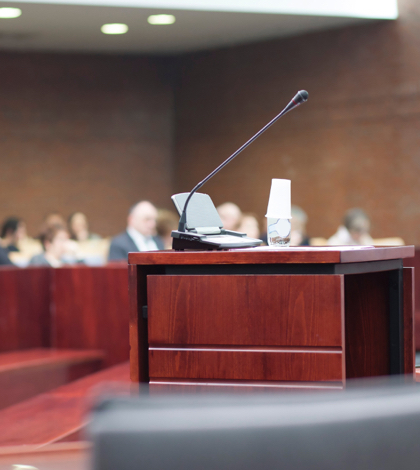Eighteen of the original 29 counts have been dismissed, and much of the testimony put on by the prosecution appears to have backfired. Closing arguments are expected to start next month.
Attorneys for the four defendants in the Colonies Crossroads corruption trial were supposed to begin presenting their case July 17 in San Bernardino County Superior Court.
Instead, they did exactly the opposite.
Not one of the attorneys for Rancho Cucamonga developer Jeff Burum, former assistant county assessor Jim Erwin, former Supervisor Paul Biane and Mark Kirk, former chief of staff to one-time Supervisor Gary Ovitt, called a single witness to testify.
The move prompted Judge Michael A. Smith to quip that “the defense case went a little quicker than we thought it would.”
He then told the two juries – Erwin’s case is being tried by a separate panel – that they could applaud the defense’s decision, as they had when the prosecution rested its case.
Both juries did so, enthusiastically.
The move was somewhat of a surprise, at least to most courtroom observers. One news report said there would likely be enough defense testimony to last at four days, which made sense considering that the prosecution began presenting its case in January.
But in military terms, each defense attorney decided to stand down, and in doing so they sent a clear a message.
Despite an avalanche of corruption-related charges against each of the defendants, including bribery, perjury and misuse of public funds, and seven months of often enormously detailed testimony, the prosecution hasn’t proven its case.
In other words, the defense believes it’s already won what has been called the largest corruption trial in the history of San Bernardino County. Why take a chance and put on witnesses?
“I think all of the evidence presented shows that each of our clients are innocent, and I think that the jury will recognize that,” said Peter Scalisi, Kirk’s attorney. “I feel 100 percent stronger now compared to when the trial began.”
Regardless of how they end up ruling, the jurors have had to absorb a staggering amount of information during the trial, which is being prosecuted jointly by the San Bernardino County District Attorney and the state Attorney General.
The case began with the development of the Colonies Crossroads, the 434-acre residential and retail project on North Campus Avenue in Upland. Burum was a partner in that development, which opened in 2005 next to the Foothill Freeway.
Prosecutors allege that Burum donated $100,000 each to political action committees controlled by Erwin, Biane and Kirk in order to secure a $102 million settlement from the Board of Supervisors.
That agreement, which the board approved in November 2006 by a 3-2 vote, ended nearly five years of lawsuits related to the Colonies project. It allowed for work on a flood control channel on the Colonies property, which was delaying development of the project.
Burum made each of the payments, which were reported as campaign contributions, after the board approved the agreement. Prosecutors allege those contributions were bribes, even though a bribe presumably would have been exchanged prior to a vote and not afterward.
All four defendants maintain their innocence and say the charges against them are politically motivated.
The defense appears to have some wind at its back as the trial enters its final phase, as much of the prosecution’s testimony seems not to have helped its case.
One of the prosecution’s star witnesses, former Supervisor Bill Postmus, recanted information he gave to investigators.
Postmus originally told investigators that Burum implied that he, Postmus, would receive political or financial help if he voted for the settlement. But Postmus testified that that wasn’t true, and said there was no “quid pro quo” associated with his vote.
Ovitt said under oath that he was not improperly influenced by Kirk, as prosecutors alleged, and that he decided to vote for the settlement before the PAC payments were made.
Also, county attorneys testified that the $102 million settlement saved the county money in potential future damages, despite claims by prosecutors that it was a bad financial deal.
Perhaps most of all, defense attorneys feel confident going into closing arguments because so much of the prosecution’s case has disappeared: 18 of the 29 felony counts in the original indictment, which was handed down in May 2011, have been dismissed.
“The prosecution had six months to prove its case and they failed,” said Stephen Larson, Burum’s attorney, when asked why the defense called no witnesses to testify. “We used those six months to cross examine their witnesses, which never happened before the indicting grand jury, to establish that these men are innocent.”
The defense’s decision not to put on any witnesses wasn’t entirely a surprise, prosecutor Lewis Cope said.
“We knew that was one option they had, so no, it didn’t surprise us,” Cope said.
When asked to comment on the number of charges that have been dropped and whether that has weakened the prosecution’s case, Cope demurred.
“That would be commenting on the state of the case, and we feel an ethical obligation not to do that,” he said. “But I can say we remain very confident in the state of the evidence and the state of our case.”
Closing arguments are scheduled to begin Aug. 14 and are expected to last about one week. Smith, who in the meantime will take a two-week vacation, told the jurors they are likely to hear six separate presentations before the cases are handed over to them for deliberation.
 IE Business Daily Business news for the Inland Empire.
IE Business Daily Business news for the Inland Empire.


